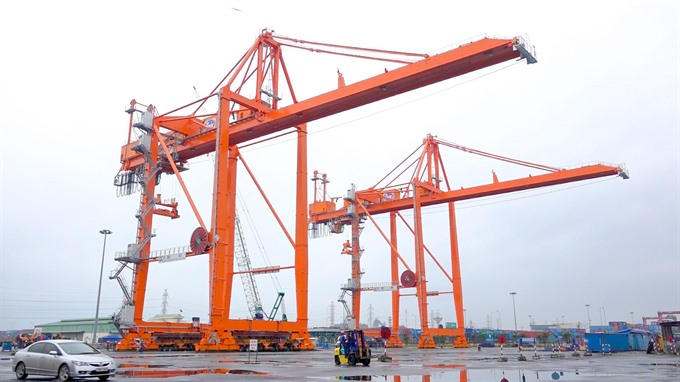 Economy
Economy

The Vietnamese logistics sector must take advantage of global integration to reach its full potential, deputy minister of industry and trade Cao Quốc Hưng said at a meeting on Friday.
 |
| A view of Tân Vũ Port, Hải Phòng City. — VNA/VNS Photo Nguyễn Thị Minh Huệ |
HÀ NỘI – The Vietnamese logistics sector must take advantage of global integration to reach its full potential, deputy minister of industry and trade Cao Quốc Hưng said at a meeting on Friday.
The growth of the Vietnamese economy is expected to help the logistics sector maintain annual growth of 12-14 per cent, Hưng said.
Opportunities for the logistics sector to continue growing include Việt Nam’s participation in the Trade Facilitation Agreement (TFA) of the World Trade Organisation (WTO) that took effect on February 2, 2017.
According to WTO economists, the TFA could help cut total trade costs of WTO members by 14.3 per cent, which would benefit developing economies the most.
In April, Prime Minister Nguyễn Xuân Phúc set out some important targets for the logistics sector.
The sector is expected to contribute 8-10 per cent of the country’s total gross domestic product (GDP) by 2025 and its growth is forecast to reach 15-20 per cent.
The percentage of outsourced logistic activities is predicted at 50-60 per cent, logistic costs are forecast to fall 16-20 per cent and Viet Nam’s ranking in the global logistics sector is hoped to climb above 50.
Currently, ministries and agencies are working to boost the sector’s performance by cutting administrative procedures and business requirements for logistic firms, developing an e-government system and online public services and publishing testing standards for local firms.
On November 9, the PM launched a programme on cost reduction for businesses and assigned ministries and agencies to improve Viet Nam’s logistics efficiency and trade facilitation, as assessed by the World Bank and Organisation of Economic Co-operation and Development (OECD).
“All of those solutions aim to create smooth trade activities and reduce logistic expenses for local companies,” Hưng stressed.
There are about 3,000 logistic firms in Việt Nam but most are small-sized, he said. Nine out of 10 Vietnamese logistic firms have charter capital of below VNĐ10 billion, 5 per cent have charter capital of between VNĐ10-20 billion and 5 per cent have charter capital of more than VNĐ20 billion.
Of the 3,000 logistic firms, only 360 have signed up to become members of the Vietnam Logistics Business Association (VLA).
"Those facts prove Vietnamese logistic companies are not well connected and most of them do business as individuals, not as a community," the deputy minister said.
According to Deputy Prime Minister Vương Đình Huệ, the earnings of Vietnamese logistic companies account for 3-4 per cent of the country’s total gross domestic product (GDP), proving their performance is still modest.
"One of the major problems for Vietnamese logistic firms is the underdevelopment of infrastructure and facilities in some provinces that can become trade hubs, however, those areas are not aware of the benefits brought about by logistic services," Hưng said.
Slow infrastructure development would make it more difficult for local firms to expand their networks and work with each other and foreign logistic firms, Hưng added.
In addition, Vietnamese logistic companies have found it hard to enter new markets and business segments, according to the industry and trade deputy minister.
"The Government needs to help Vietnamese logistic firms develop and catch up with foreign companies," he added.
“Logistic firms often have opportunities to work with and learn from foreign businesses, so they are able to develop better strategies and offer products and services with better quality at cheaper price levels.”
"Other tasks include the Government’s efforts to improve its management, simplify and clarify administrative procedures and make the business environment more transparent and convenient," Hưng added.
In addition, it is important to help local businesses expand their networks to other markets so the sector is able to keep up its current growth rate, according to VLA vice chairman Đào Trọng Khoa. – VNS




